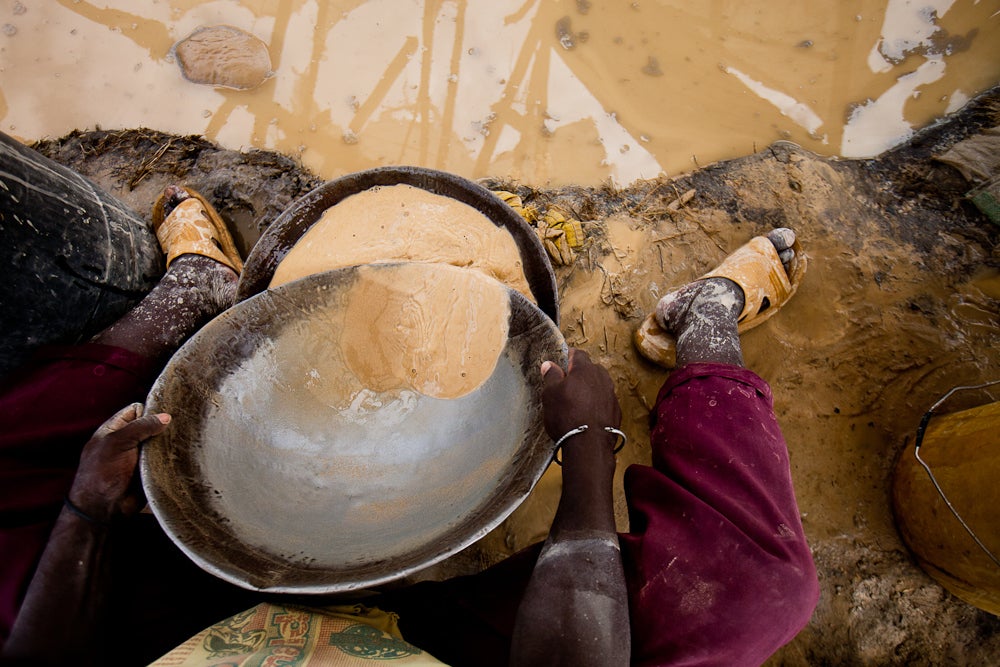Five human rights groups write to LBMA’s CEO raising concerns
Over the past year RAID has repeatedly raised concerns with the London Bullion Market Association (LBMA) regarding weaknesses in its Responsible Sourcing Programme.
Today we write to the LBMA’s CEO, Ruth Crowell, with five leading Swiss and British human rights groups, questioning the credibility of the LBMA scheme for failing to flag and stop the trade in tainted gold.
We join Global Witness, SwissAid, Fastenopfer and Society for Threatened Peoples to point to serious shortcomings in the formulation and implementation of the LBMA’s Responsible Gold Guidance.
In our view, the LBMA’s claim that its Responsible Sourcing Programme is robust and that all the gold it certifies is free of human rights abuses is simply not credible. Consumer-facing brands such as Apple, Nokia, Tesla, Amazon and Disney, jewellers and gold retailers, as well as many gold-based investments, rely upon the LBMA’s gold certification scheme. The serious weaknesses identified in our research means that downstream customers cannot have confidence that the LBMA’s Good Delivery gold is not tainted by human rights abuses and links to conflict.
The LBMA’s first annual Responsible Sourcing Report 2020 does not go nearly far enough when it comes to transparency. It fails to provide information on where gold is actually mined, sheds little light on the LBMA’s opaque oversight role and its handling of complaints.
The LBMA’s guidance is also not aligned with underlying OECD Due Diligence Guidance for Responsible Supply Chains. Until this improves, the LBMA’s responsible sourcing scheme should not be recognised under a new Europe-wide Conflict Minerals Regulation now in place to clamp-down on the trade in illicit gold and other minerals. The LBMA needs to be prepared to expose and act upon non-compliance.
To see our joint letter including our correspondence with and recommendations to the LBMA, click here.
“The LBMA’s claim that its Responsible Sourcing Programme is robust and that all the gold it certifies is free of human rights abuses is simply not credible. The serious weaknesses exposed by civil society groups means those who buy the gold, such as manufacturers like Apple and Tesla, or jewellery customers, cannot have confidence that the LBMA’s Good Delivery gold is free of human rights abuses. The LBMA cannot in good faith tell local communities whose residents have been assaulted or shot dead by security personnel guarding a mine that it has certified the refined gold as free from human rights abuse. Until there are substantial improvements, the LBMA’s programme should not be recognized as meeting the standards of the EU’s Conflict Minerals Regulation, which came into effect in January 2021.”
– Anneke Van Woudenberg, Executive Director of corporate watchdog, RAID
“Serious weaknesses in the LBMA responsible gold programme mean that downstream customers cannot have confidence that the LBMA’s Good Delivery gold is free of human rights abuses and links to conflict. The LBMA found one of its refiners to be fully compliant with its standard despite this refiner having sourced gold from a supplier linked to conflict gold. This demonstrates that after almost 10 years the LBMA standard is still not aligned to the OECD Guidance, which calls for an immediate suspension of engagement with a refiner in such a case. Therefore, the LBMA’s Responsible Gold Guidance clearly falls short of the internationally recognised OECD standards and should not be recognised by the EU’s Conflict Minerals Regulation until there are substantial improvements. The LBMA must urgently address the problems with its responsible sourcing programme. Otherwise, it risks being complicit in human rights abuses and conflict finance in producer countries and tarnishing its reputation as the gold sector’s leading accreditation body.”
– Alex Kopp, campaigner at Global Witness
“Certain LBMA certified refineries continue to be involved in serious human rights abuses and to source gold from suppliers linked to conflict. Faced with a lack of sanctions for such violations, insufficient transparency in audit reports and a lack of alignment with the OECD Guidance, the LBMA standard contains serious shortcomings that prevent it from guaranteeing gold free from human rights abuses. Until there are substantial improvements, the LBMA’s Responsible Gold Guidance should not be recognized by the EU’s Conflict Minerals Regulation.”
– Marc Ummel, raw materials officer at the Swiss NGO SWISSAID
Photo: Trevor Snapp

